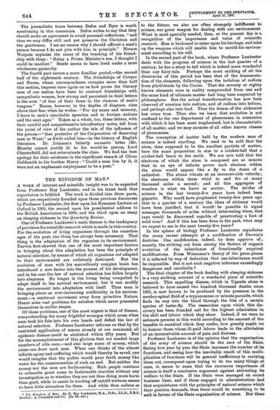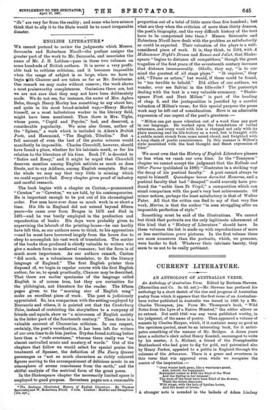THE KINGDOM OF MAN.*
A woma of interest and scientific insight was to be expected from Professor Ray Lankester, and in his latest book that expectation is fulfilled. The work is divided into three parts which are respectively founded upon three previous discourses by Professor Lankester, the first upon his Romanes Lecture at Oxford in 1905, the second upon his presidential address to the British Association in 1906, and the third upon an essay on sleeping sickness in the Quarterly Review.
One of Professor Lankester's main themes is the inadequacy of provision for scientific research which is made in this country. For the evolution of living organisms through the countless ages of the past, one thing has always been necessary. That thing is the adaptation of the organism to its environment. Darwin first showed that one of the most important factors in bringing about this adaptation has been the principle of natural selection, by means of which all organisms not adapted to their environment are ruthlessly destroyed. But the evolution of man with his marvellously complex brain has introduced a new factor into the process of his development, and in his case the law of natural selection has fallen largely into abeyance. No longer is the living being compelled to adapt itself to the natural environment, but it can modify the environment into adaptation with itself. Thus man is bringing about an ever-increasing artificiality in his environ- ment,—a continual movement away from primitive Nature. Hence arise vast problems for solution which never presented themselves in earlier stages.
Of these problems, one of the most urgent is that of disease, comprehending the many frightful scourges which arose when man took his fate into his own hands and defied the law of natural selection. Professor Lankester informs us that by the unstinted application of means already at our command, all epidemic disease could be abolished within fifty years. But for the accomplishment of this glorious feat are needed large numbers of able men,—and also large sums of money, which alone can draw such men. When one thinks of the almost infinite agony and suffering which would thereby be saved, one would imagine that the public would pour forth money like water for the consummation of such an end. But neither the money nor the men are forthcoming. Rich people continue to subscribe great sums to fashionable charities without any investigation as to whether they are not thus doing more harm than good, while to assist in warding off untold tortures seems to have little attraction for them. And while thus callous as
• The Kingdom of M.. By E. Bay Lankester, M.A., D.Sc., LL.D., F.R.S. London : a. Constable and Co. lie. 6d. net.'
to the future, we also are often strangely indifferent to science, our great weapon for dealing with our environment. What is most specially needed, then, at the present day is a recognition of the importance and value of scientific research. Man is beckoned to enter upon his heritage, and take up the weapons which will enable him to mould his environ- ment according to his will.
In the second part of the book, where Professor Lankester deals with the progress of science in the last quarter of a century, be has a story to tell which is indeed more wonderful than any fairy-tale. Perhaps the most striking of all the discoveries of this period has been that of the transmuta- tion of the elements, following upon the isolation of radium from pitchblende by the Curies. That the seventy or eighty known elements were in reality compounded from one and the same kind of ultimate matter had long been suspected by philosophers. But the actual transformation has now been observed of uranium into radium, and of radium into helium, and perhaps also into lead. Thus the dream of the alchemist has coma true. Thus also we learn that evolution is not confined to the one department of phenomena in connexion with which it has been most emphasised, but is characteristic of all matter, and we may surmise of all other known classes of phenomena.
The conception of matter held by the modern man of science is indeed startling. We used to be told that the atom, then supposed to be the smallest particle of matter, bore the same proportion in size to a cricket-ball that a cricket-ball bears to the earth. We are now told that the electrons of which the atom is composed are so minute that to an eye of infinite power each electron within the atom would appear like a fly in the dome of a cathedral. The atoms vibrate at an inconceivable velocity ; the electrons within them whirl to and fro at many thousand miles a second ; and all this aggregate of wonders is what we know as matter. The strides of science in the last twenty-five years have indeed been gigantic. Who could have prophesied twenty-five years ago that in a quarter of a century the ideas of alchemy would have been justified, that it would' be possible to signal messages thousands of miles without intervening wires, that rays would be discovered capable of penetrating a foot of solid iron? And if this has been done in the past, what may we expect to see in the next twenty-five years ?
In the sphere of biology Professor Lankester repudiates the many recent attempts at a modification of Darwin's doctrine. One modification, indeed, he does approve of ; namely, the striking out from among the factors of organic evolution of the inheritance of functionally acquired modifications. From Weismann's theory of the germ-plasm it is inferred by way of deduction that use-inheritance would be impossible. But is not such negative inference exceedingly dangerous and unreliable ?
The final chapter of the book dealing with sleeping sickness is a very striking account of a wonderful piece of scientific research. This appalling disease, which in Uganda alone is believed to have caused two hundred thousand deaths since 1901, is now known to be produced by the presence in the cerebro-spinal fluid of a trypanosome or minute parasite, which finds its way into the blood through the bite of a certain species of tsetse-fly. The researches upon which this dis- covery has been founded call for the highest admiration in the skill and labour which they show. Indeed, if we were to estimate persona in this world according to the amount of the benefits to mankind which they confer, how greatly ought we to honour those whose ill-paid labour leads to the alleviation of an inconceivable amount of pain and distress.
Professor Lankester is of the opinion that the organisation of the army of science should be the care of the State. Seeing how year by year the State increases the number of ita functions, and seeing how the inevitable result of this multi- plication of functions will be general inefficiency in carrying them out, consequent upon trying to do too many things at once, it, seems to some that the enormous importance .of science is itself a conclusive argument against entrusting ita welfare to the State. If the State were managed on sound business lines, and if those engaged in administration had that acquaintance with the principles of natural science which their position demands, then there would be something to be said in favour of the State organisation of science. But these "ifs" are very far from the reality ; and some who love science think that to ally it to the State would be to court irreparable disaster.



























































 Previous page
Previous page